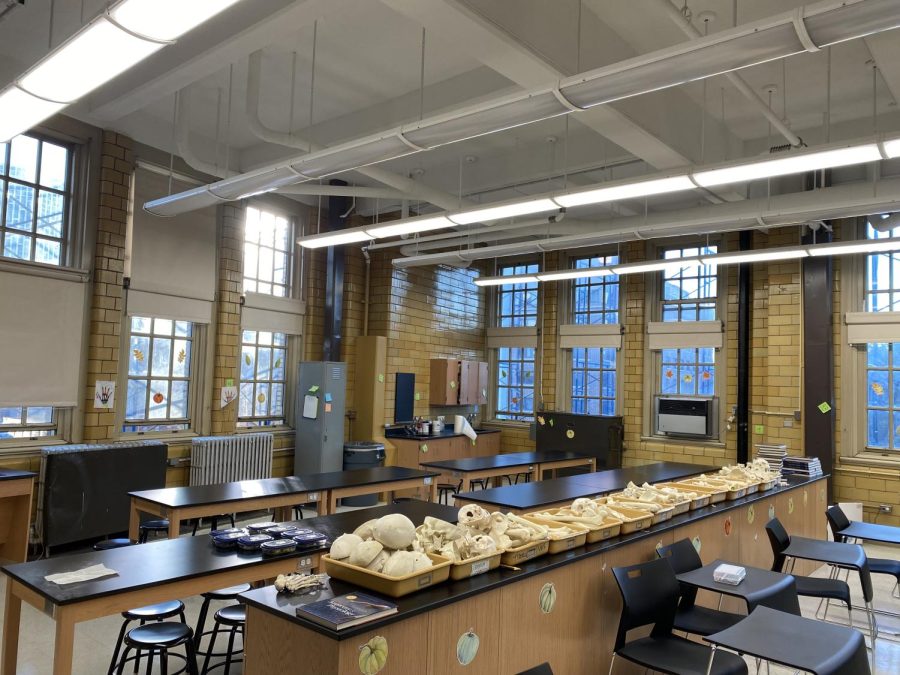COVID-19’s Impact on Women’s STEM Research
4N8 – Anatomy/Physiology Room
December 20, 2021
Without access to regular working conditions like offices or labs, the lack of a work-life balance has been impacting women in STEM the heaviest. The National Academies of Sciences, Engineering, and Medicine’s 2021 Consensus Report examined the current inequalities in access to successful STEM research, alongside how the pandemic has exacerbated them.
The biggest issue that female scientists and researchers are facing is that the majority of STEM research needs to be done in a lab. Though technology and movement towards online-based work has been coupled with many programs that are targeted towards female research, this has only been able to work on a mass scale for fields like computer science, in which all work is done on computers anyway. The progress of science and engineering has unfortunately been hindered by the inability to conduct work with test subjects and teams.
The difference in responsibilities between female and male youth has only exacerbated this issue. During COVID lockdowns, girls between the ages of 14 and 24 spent 69% more time cleaning and 28% more time caring for siblings compared to their male counterparts according to the Consensus Report. Besides a lack of facilities and resources that would provide accessibility to research, expectations for household work affect women’s STEM successes.
Tech’s Weston Scholars Program aims to provide students who are passionate about ideas and inventions with access to labs and mentors. They are given the opportunity to learn lab procedures and conduct their own preliminary experiments with professors and experts from local colleges. In-person, hands-on experiences are the highlight of the program, which many students cannot find outside of their core science classes’ curriculum.
One Weston Scholar, Mariya Meleganich (‘22), explained that when the pandemic hit and school moved online, she was still able to continue with her neuroscience projects, working virtually with two professors. However, her online work gave her a very different experience than what she experienced in pre-COVID conditions. Virtual projects consisted of data collection from online databases, but as in-person learning returned, she was able to get back to hands-on research that allowed her to work with the human test subjects whom she was originally supposed to work with. “The process was discouraging at the beginning, because we all knew that the quality of our work would not be the same, and that we could not attain our highest potential by being confined to conducting research to the four walls of our rooms … I’m lucky that I even get to go back to working in pre-COVID conditions, as some of the researchers in classes before mine were not able to finish their projects.”
When asked about female peers, Mariya noticed that many had only a “drop of interest in the Weston program” and more “ brushed off work and did not find motivation or even direction in their respective research projects.” It is necessary to add that this is mostly a pattern that was visible in students from the class of 2022, whose research process was disrupted due to COVID-19 restrictions, while female underclassmen, new to the program, are showing enthusiasm as they get the chance to conduct research in person for the first time.
Out of the research and articles that are being published in scientific journals from the school year that took place online, two-thirds are coming from girls she mentors. Though not noticing a decrease in participation and commitment to the program, Dr. Parlo, a mentor of the Weston Scholars program and a Biology teacher at Tech, admits that: “It’s in the hands of those who want to get things done. For those who are going to put the effort in, we have the resources to help them.” It has been challenging to “come up with something that’s novel and relevant,” even before the pandemic, so this was exacerbated with additional pressures. However, as Mariya explained, there is a visible increase in participation from underclassmen, and a lot more students have been reaching out to share their interest in the program post-Covid.
On the national level that examines female scientists in the workforce, it is clear that COVID-19 has drastically set back the way women can conduct their research productively. At Tech, we see girls pushing through these challenges, especially with the Weston Scholars program, where women’s participation in STEM is encouraged, and mentors work towards increasing female confidence in the field.







































